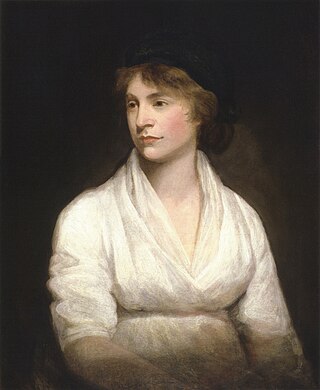
Mary Wollstonecraft was a British writer, philosopher, and advocate of women's rights. Until the late 20th century, Wollstonecraft's life, which encompassed several unconventional personal relationships at the time, received more attention than her writing. Today Wollstonecraft is regarded as one of the founding feminist philosophers, and feminists often cite both her life and her works as important influences.

Margaret Eleanor Atwood is a Canadian poet, novelist, literary critic, essayist, teacher, environmental activist, and inventor. Since 1961, she has published 18 books of poetry, 18 novels, 11 books of non-fiction, nine collections of short fiction, eight children's books, and two graphic novels, and a number of small press editions of both poetry and fiction. Atwood has won numerous awards and honors for her writing, including two Booker Prizes, the Arthur C. Clarke Award, the Governor General's Award, the Franz Kafka Prize, Princess of Asturias Awards, and the National Book Critics and PEN Center USA Lifetime Achievement Awards. A number of her works have been adapted for film and television.
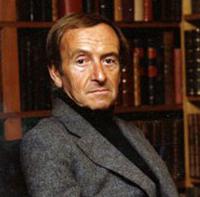
Brian Moore, was a novelist and screenwriter from Northern Ireland, who emigrated to Canada and later lived in the United States. He was acclaimed for the descriptions in his novels of life in Northern Ireland during and after the Second World War, in particular his explorations of the inter-communal divisions of The Troubles, and has been described as "one of the few genuine masters of the contemporary novel". He was awarded the James Tait Black Memorial Prize in 1975 and the inaugural Sunday Express Book of the Year award in 1987, and he was shortlisted for the Booker Prize three times. Moore also wrote screenplays and several of his books were made into films.

Elizabeth Bowen CBE was an Irish-British novelist and short story writer notable for her books about the "big house" of Irish landed Protestants as well her fiction about life in wartime London.

Mary Chavelita Dunne Bright, better known by her pen name George Egerton, was a writer of short stories, novels, plays and translations, noted for her psychological probing, innovative narrative techniques, and outspokenness about women's need for freedom, including sexual freedom. Egerton is widely considered to be one of the most important writers in the late nineteenth century New Woman movement, and a key exponent of early modernism in English-language literature. Born in Melbourne, Australia, she spent her childhood in Ireland, where she settled for a time, and considered herself to be "intensely Irish".
Nationality words link to articles with information on the nation's poetry or literature.

Maria: or, The Wrongs of Woman is the 18th-century British feminist Mary Wollstonecraft's unfinished novelistic sequel to her revolutionary political treatise A Vindication of the Rights of Woman (1792). The Wrongs of Woman was published posthumously in 1798 by her husband, William Godwin, and is often considered her most radical feminist work.
Nightwood Theatre is Canada's oldest professional women's theatre and is based in Toronto. It was founded in 1979 by Cynthia Grant, Kim Renders, Mary Vingoe, and Maureen White and was originally a collective. Though it was not the founders' original intention, Nightwood Theatre has become known for producing feminist works. Some of Nightwood's most famous productions include This is For You, Anna (1983) and Good Night Desdemona (1988). Nightwood hosts several annual events including FemCab, the Hysteria Festival, and Groundswell Festival which features readings from participants of Nightwood's Write from the Hip playwright development program.
Joan Shakespeare was the sister of William Shakespeare. She is the only member of the family whose known descendants continue down to the present day.
Alta Gerrey is a British-American poet, prose writer, and publisher, best known as the founder of the feminist press Shameless Hussy Press and editor of the Shameless Hussy Review. Her 1980 collection The Shameless Hussy won the American Book Award in 1981. She is featured in the feminist history film She's Beautiful When She's Angry.
Maura Laverty was an Irish novelist, playwright, journalist, broadcaster and cookery expert known for her work on the Irish television drama serial, Tolka Row. She published several novels, short stories and critical pieces throughout her career.
Claudia Casper is a Canadian writer. She is best known for her bestseller novel The Reconstruction, about a woman who constructs a life-sized model of the hominid Lucy for a museum diorama while trying to recreate herself. Her third novel, The Mercy Journals, written as the journals of a soldier suffering PTSD in the year 2047, won the 2016 Philip K. Dick Award for distinguished Science fiction.
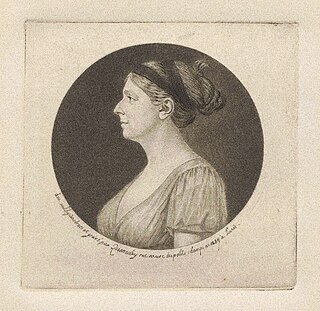
Margaret King (1773–1835), also known as Margaret King Moore, Lady Mount Cashell and Mrs Mason, was an Anglo-Irish hostess, and a writer of female-emancipatory fiction and health advice. Despite her wealthy aristocratic background, she had republican sympathies and advanced views on education and women's rights, shaped in part by having been a favoured pupil of Mary Wollstonecraft. Settling in Italy in later life, she reciprocated her governess's care by offering maternal aid and advice to Wollstonecraft's daughter Mary Shelley and her travelling companions, husband Percy Bysshe Shelley and stepsister Claire Clairmont. In Pisa she continued the study of medicine which she had begun in Germany and published her widely read Advice to Young Mothers, as well as a novel, The Sisters of Nansfield: A Tale for Young Women.

The Revolution Script is a fictionalised account by Northern Irish-Canadian novelist Brian Moore of key events in Quebec's October Crisis – the kidnapping by the Quebec Liberation Front of James Cross, the Senior British Trade Commissioner in Montreal, on October 5, 1970 and the murder, a few days later, of Pierre Laporte, Minister of Labour in the Quebec provincial government. It was published in Canada and the United States at the end of 1971. The British newspaper The Sunday Times reproduced excerpts from the book and it was published in the United Kingdom in January 1972.

Judith Hearne, was regarded by Northern Irish-Canadian writer Brian Moore as his first novel. The book was published in 1955 after Moore had left Ireland and was living in Canada. It was rejected by 10 American publishers, then was accepted by a British publisher. Diana Athill's memoir Stet (2000) has information about the publishing of Judith Hearne.
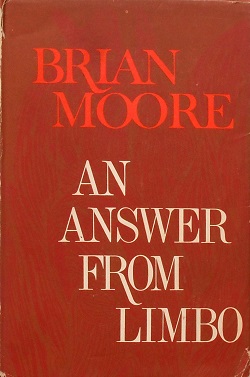
An Answer from Limbo is a novel by Northern Irish-Canadian writer Brian Moore, published in October 1962. It was written between November 1960 and early 1962, when Moore was living in New York.
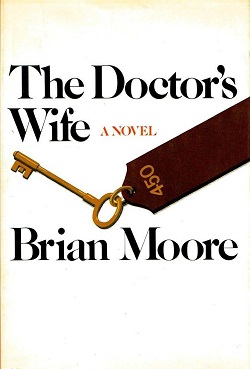
The Doctor's Wife is a novel by Northern Irish-Canadian writer Brian Moore, published in 1976. Shortlisted for the Booker Prize, it tells the story of Sheila Redden, a doctor's wife from Belfast, who takes an American lover eleven years her junior while in Paris. She then separates from both her husband and her new lover.
Patricia Watson was an award-winning Canadian filmmaker. She wrote, directed and produced numerous films and documentaries such as The Invention of the Adolescence (1967) and The Legacy of Mary McEwan (1987) which were her most well known and significant films.

Eithne Strong was a bilingual Irish poet and writer who wrote in both Irish and English. Her first poems in Irish were published in Combhar and An Glor 1943-44 under the name Eithne Ni Chonaill. She was a founder member of the Runa Press whose early Chapbooks featured artwork by among others Jack B. Yeats, Sean Keating, Sean O'Sullivan, Harry Kernoff among others. The press was noted for the publication in 1943 of Marrowbone Lane by Robert Collis which depicts the fierce fighting that took place during the Easter Rising of 1916.
Feminist poetry is inspired by, promotes, or elaborates on feminist principles and ideas. It might be written with the conscious aim of expressing feminist principles, although sometimes it is identified as feminist by critics in a later era. Some writers are thought to express feminist ideas even if the writer was not an active member of the political movement during their era. Many feminist movements, however, have embraced poetry as a vehicle for communicating with public audiences through anthologies, poetry collections, and public readings.












